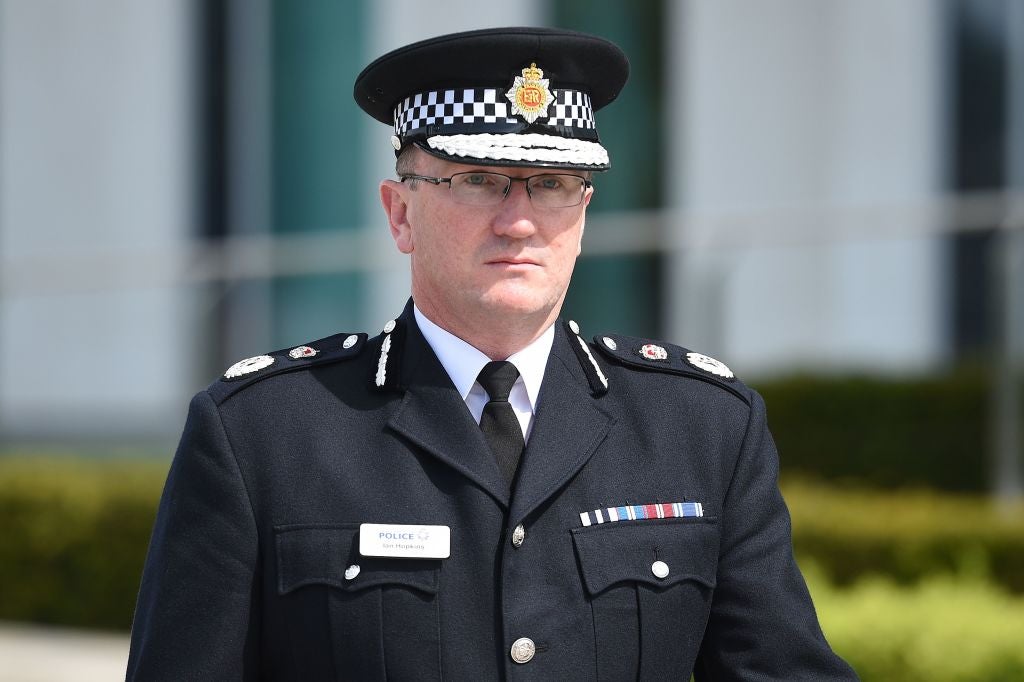Greater Manchester Police chief to stand down immediately after force put in special measures
Ian Hopkins was due to retire next summer but is quitting earlier due to ill health

The chief of Greater Manchester Police (GMP) is stepping down after the force was placed in special measures for failing to record more than 80,000 crimes in the space of a year.
Ian Hopkins, who served in his role for 13 years, said in a statement he was due to retire next summer but that because of his current ill health and the impending implementation of the force’s “long-term strategic plan”, he would leave with immediate effect.
His announcement came after Her Majesty’s Inspectorate of Constabulary and Fire and Rescue Services (HMICFRS) said the force “did not record an estimated 80,100 crimes reported to it between 1 July 2019 and 30 June 2020”.
In a statement, Mr Hopkins said: “These are challenging times for Greater Manchester Police. The force has a long-term strategic plan to address the issues raised by the HMIC and I believe this plan should be led by a chief constable who can oversee it from start to finish. Considering what is best for GMP and the communities we serve, and given my current ill health, I have decided to stand down from the post of chief constable with immediate effect.
“It has been an honour to serve the public for 32 years, nearly 13 of which as a chief officer in GMP. Throughout my career I have been committed to achieving the best outcomes for the people I serve. The decision to stand down is not one I have taken lightly but I feel the time is right.
“I was due to retire in autumn 2021 and bringing that date forward assists in the timely recruitment of my successor.
“I would like to pay tribute to my colleagues and the many dedicated officers and staff I have had the privilege of working with throughout my service.”
Two days ago, Mr Hopkins revealed that since the end of October he had been suffering from labyrinthitis – an inner-ear infection that affects balance – and was on sick leave.
Andy Burnham, the Greater Manchester mayor, said Deputy Chief Constable Ian Pilling would assume Mr Hopkins’ duties ahead of a full recruitment process.
He said Mr Hopkins had led the force during “one of the most difficult periods in its history”, dealing with budget cuts and “complex threats” such as the Manchester Arena terror attack.
Mr Burnham added: “In other important areas, however, the organisation has not made the progress needed. It is an important principle of policing in this country that it is operationally independent from political interference.
"I do not run Greater Manchester Police on a day-to-day basis. Instead, it is my job to hold the chief constable to account, and by extension the force for the services provided to our residents.
“At times this essential task has been made too difficult by an overly defensive culture within GMP. This needs to change if GMP is to develop the open learning culture that will allow the failures identified by HMIC to be properly addressed.
“Improvements are now overdue. So both I and the deputy mayor, whilst paying tribute today to Ian’s 12 years of service to Greater Manchester Police have concluded that now is the time for new leadership, and a new era in our police force.”
A report published last week by HMICFRS branded Greater Manchester Police’s service to victims of crime as “a serious cause of concern”.
In its damning report, it said the force had failed to record more than one in every five crimes reported by the public and more than one in every four violent crimes; that it had failed to record a high proportion of violent crime including domestic abuse and behavioural crimes, such as harassment, stalking and coercive controlling behaviour; that it had taken some steps to improve the response to non-emergency 101 calls, but was still not answering about one in five that came into the system; and that it had failed to make sure all investigations were conducted effectively, with investigation plans not completed to an acceptable standard and no appropriate levels of review and supervision.
It added that the force had generally responded well to calls from the public and deployed the right resources to help, and that it had markedly improved how accurately it recorded sexual offences – in particular, crimes of rape.
HM inspector of constabulary Zoe Billingham said it was not good enough that the concerns had not been addressed for over four years, but acknowledged that the force is taking action to address the issues.
“Senior leaders in the force are demonstrating their intent to improve the service to victims through investment in the force control room and other infrastructure projects,” she said.
“The force’s recent marked improvement in its recording of serious sexual offences and rapes shows that it can get this vitally important aspect of policing right – but it now needs to do so across the board. I expect the force to make a concerted effort to quickly address the significant failings that we have identified as this situation cannot continue.”
With reporting by Press Association



